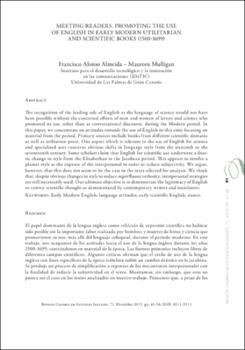Meeting Readers. Promoting the Use of English in Early Modern Utilitarian and Scientific Books (1500-1699)
Fecha
2015Resumen
El papel dominante de la lengua inglesa como vehículo de expresión científica no hubiese sido posible sin la importante labor realizada por hombres y mujeres de letras y ciencia que promovieron su uso, más allá del lenguaje coloquial, durante el período moderno. En este trabajo, nos ocupamos de las actitudes hacia el uso de la lengua inglesa durante los años 1500-1699, centrándonos en material de la época. Las fuentes primarias incluyen libros de diferentes campos científicos. Algunos críticos afirman que el estilo de uso de la lengua inglesa con fines específicos de la época isabelina sufrió un cambio drástico en la jacobina.
Se produjo un proceso de simplificación a expensas de los mecanismos interpersonales con la finalidad de reducir la subjetividad en el texto. Mostramos, sin embargo, que esto no parece ser el caso en los textos analizados en nuestro trabajo. Pensamos que, a pesar de los cambios de estilo obvios para reducir texto superfluo propio del estilo ampuloso de la época isabelina, las estrategias interpersonales se utilizan necesariamente en los años siguientes.
Nuestro objetivo final es demostrar la legitimidad de la lengua inglesa para transmitir el pensamiento científico, como reivindican los escritores y traductores estudiados. The recognition of the leading role of English as the language of science would not have been possible without the concerted efforts of men and women of letters and science who promoted its use, other than as conversational discourse, during the Modern period. In this paper, we concentrate on attitudes towards the use of English in this time focusing on material from the period. Primary sources include books from different scientific domains as well as utilitarian prose. One aspect which is relevant to the use of English for science and specialised uses concerns obvious shifts in language style from the sixteenth to the seventeenth century. Some scholars claim that English for scientific use underwent a drastic change in style from the Elizabethan to the Jacobean period. This appears to involve a plainer style at the expense of the interpersonal in order to reduce subjectivity. We argue, however, that this does not seem to be the case in the texts selected for analysis. We think that, despite obvious changes in style to reduce superfluous verbosity, interpersonal strategies are still necessarily used. Our ultimate objective is to demonstrate the legitimacy of English to convey scientific thought as demonstrated by contemporary writers and translators.





